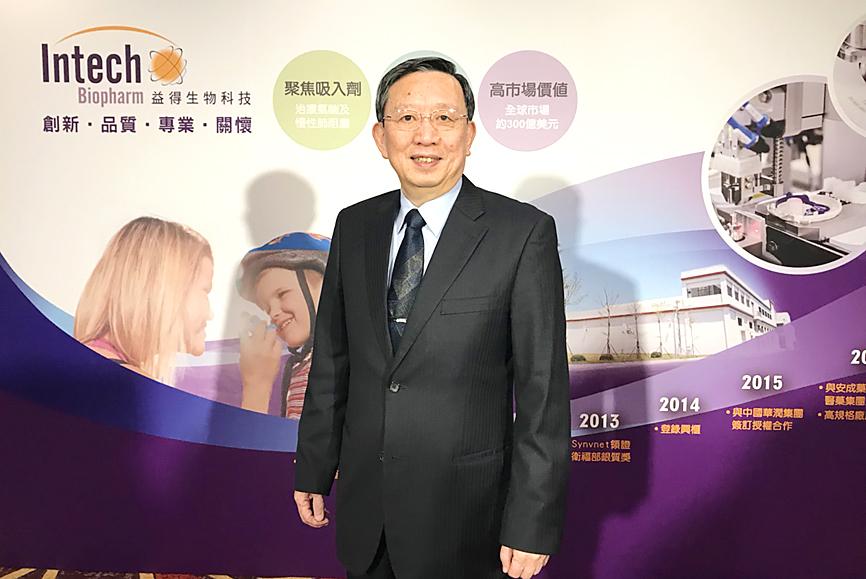Intech Biopharm Corp (益得生技) has started testing the effects of a metered-dose inhaler generic of Teva Pharmaceutical Industries Ltd’s ProAir, and expects to gain marketing approval by 2023, it said yesterday.
The company, which developed SYN011 to treat acute asthma, received approval from the US Food and Drug Administration in August to study the biochemical and physiological effects of the drug in a phase 3 clinical trial, Intech spokesperson Hugues Hung (洪堯國) told the Taipei Times.
The company has recruited about 200 participants with asthma for the test, dividing them into control and experiment groups to receive a placebo, a brand name drug and SYN011, to determine whether SYN001’s efficacy is comparable to that of a brand name drug, Hung said.

Photo: CNA
“We have to give participants some food containing allergens that can trigger asthma symptoms. We will see how the inhaler relieves the symptoms,” Hung said.
The study is to finish by the end of next year, and Intech plans to apply to the US agency for marketing approval in the first quarter of 2023, he said.
Intech is optimistic about the metered-dose inhalers market in the US, where the health regulator has become more open to generics amid the COVID-19 pandemic, he said.
Prior to the pandemic, the agency never approved generic versions of metered-dose inhalers, although some applicants had completed trials, Hung said.
As the pressurized metered-dose inhalers could be used to help relieve respiratory symptoms of people with COVID-19, the US regulator last year became more open, granting approvals to India-based Cipla Ltd and Lupin Ltd, which offer generic versions of Merck Sharp & Dohme Ltd’s (MSD) Proventil and Teva’s ProAir respectively, he said.
Last year, Cipla sold about 3 million inhalers and Lupin sold 1 million at lower prices than those of brand names, or at a discount of between 50 and 60 percent, Hung said.
Sales of MSD’s and Teva’s drugs were not affected by the generic versions, and they even raised their prices, suggesting there is a growing demand for the drug in the market, he said.
Intech expects to be the latest supplier of metered-dose inhalers using salbutamol as the main ingredient, which is used to relieve symptoms of asthma, after GlaxoSmithKline PLC, MSD, Teva and the two Indian firms, Hung said.
“With this market position, we will likely gain a market share of 10 to 20 percent,” he said.
More than 64 million metered-dose inhalers using salbutamol were sold in the US last year, Hung said, adding that a larger market share would help boost Intech’s revenue.

The New Taiwan dollar is on the verge of overtaking the yuan as Asia’s best carry-trade target given its lower risk of interest-rate and currency volatility. A strategy of borrowing the New Taiwan dollar to invest in higher-yielding alternatives has generated the second-highest return over the past month among Asian currencies behind the yuan, based on the Sharpe ratio that measures risk-adjusted relative returns. The New Taiwan dollar may soon replace its Chinese peer as the region’s favored carry trade tool, analysts say, citing Beijing’s efforts to support the yuan that can create wild swings in borrowing costs. In contrast,

Nvidia Corp’s demand for advanced packaging from Taiwan Semiconductor Manufacturing Co (TSMC, 台積電) remains strong though the kind of technology it needs is changing, Nvidia CEO Jensen Huang (黃仁勳) said yesterday, after he was asked whether the company was cutting orders. Nvidia’s most advanced artificial intelligence (AI) chip, Blackwell, consists of multiple chips glued together using a complex chip-on-wafer-on-substrate (CoWoS) advanced packaging technology offered by TSMC, Nvidia’s main contract chipmaker. “As we move into Blackwell, we will use largely CoWoS-L. Of course, we’re still manufacturing Hopper, and Hopper will use CowoS-S. We will also transition the CoWoS-S capacity to CoWos-L,” Huang said

VERTICAL INTEGRATION: The US fabless company’s acquisition of the data center manufacturer would not affect market competition, the Fair Trade Commission said The Fair Trade Commission has approved Advanced Micro Devices Inc’s (AMD) bid to fully acquire ZT International Group Inc for US$4.9 billion, saying it would not hamper market competition. As AMD is a fabless company that designs central processing units (CPUs) used in consumer electronics and servers, while ZT is a data center manufacturer, the vertical integration would not affect market competition, the commission said in a statement yesterday. ZT counts hyperscalers such as Microsoft Corp, Amazon.com Inc and Google among its major clients and plays a minor role in deciding the specifications of data centers, given the strong bargaining power of

INDUSTRY LEADER: INDUSTRY LEADER: Taiwan Semiconductor Manufacturing Co (TSMC, 台積電), a major chip supplier to Nvidia Corp and Apple Inc, yesterday said it aims to grow revenue by about 25 percent this year, driven by robust demand for artificial intelligence (AI) chips. That means TSMC would continue to outpace the foundry industry’s 10 percent annual growth this year based on the chipmaker’s estimate. The chipmaker expects revenue from AI-related chips to double this year, extending a three-fold increase last year. The growth would quicken over the next five years at a compound annual growth rate of 45 percent, fueled by strong demand for the high-performance computing